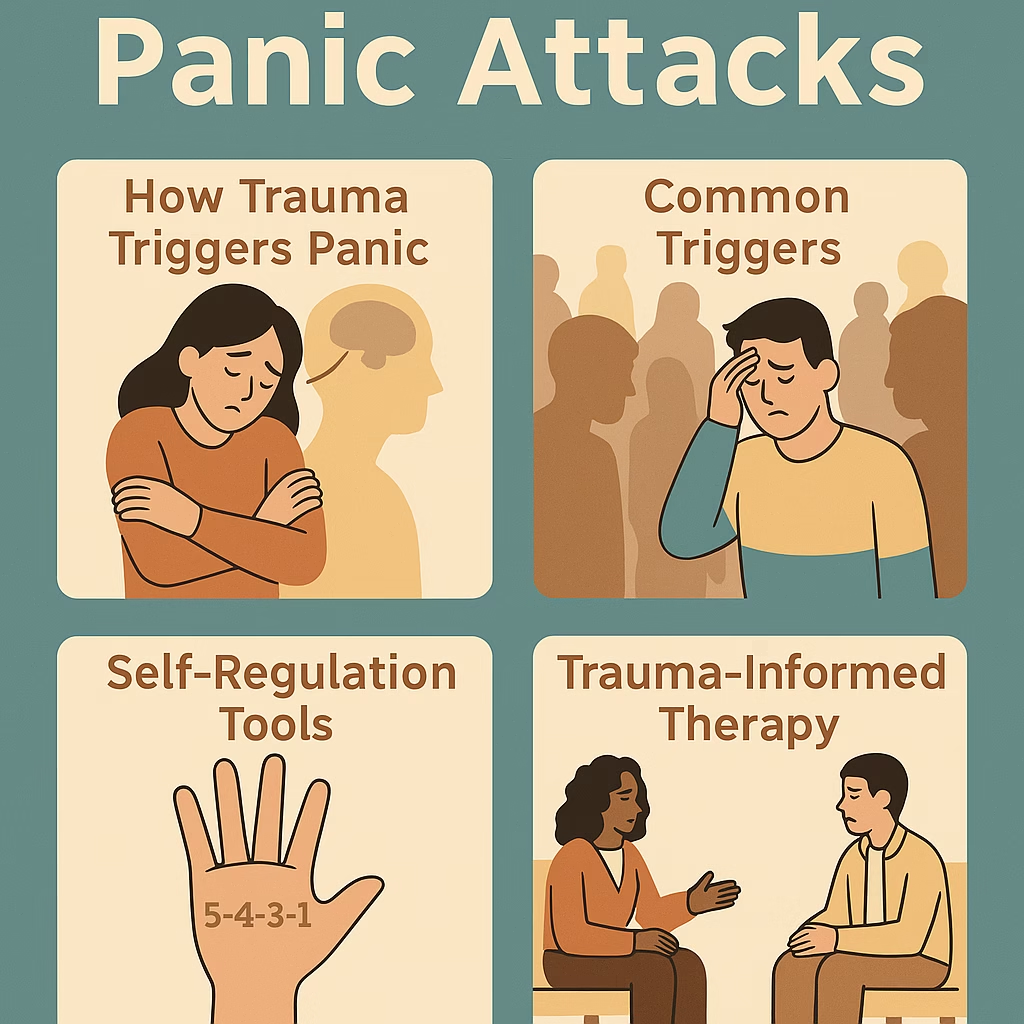
Trauma and Panic Attacks: Understanding the Connection and Finding Relief
By Darin King Counseling LLC — Compassionate, trauma-informed therapy across Pennsylvania (telehealth available). This post is for educational purposes only and not medical advice.
Panic attacks are intense bursts of fear that feel overwhelming and uncontrollable. For many people, especially trauma survivors, panic attacks aren’t “random” — they are the nervous system responding as if the past threat is happening again. The good news? With the right tools and trauma-informed therapy, it is possible to reduce their intensity, frequency, and emotional hold.
What Is a Panic Attack?
A panic attack is a sudden surge of fear or discomfort that peaks within minutes. Symptoms often include:
- Rapid heartbeat
- Shortness of breath
- Chest tightness
- Shaking or dizziness
- Nausea or tingling
- Feeling detached or unreal (derealization)
- Fear of losing control or dying
Even though these experiences feel life-threatening, panic attacks are not physically dangerous. They are a false alarm of the nervous system.
How Trauma Triggers Panic
People who’ve experienced trauma (especially unresolved or complex trauma) often have a more sensitive threat detection system. This means their brain and body may interpret neutral or mildly stressful events as dangerous.
Here’s how it works:
- The amygdala (fear center) becomes overactive
- The hippocampus (memory) confuses past and present
- The prefrontal cortex (logic) goes offline during panic
This can lead to a full-body alarm response even when there’s no current danger. That’s why panic attacks can seem to come “out of nowhere.”
Common Trauma-Linked Triggers
- Loud noises, arguments, or sudden changes
- Crowded spaces or feeling trapped
- Body sensations (e.g., tight chest, racing heart)
- Sleep loss, overstimulation, or caffeine
- Anniversaries or reminders of past trauma
Even positive life events (like starting a new job or relationship) can feel unsafe to a nervous system shaped by trauma.
The Vicious Cycle
After experiencing panic, many people become afraid of having another one. This fear creates more tension and hypervigilance, which makes another panic episode more likely. This is sometimes called “fear of fear.”
How Therapy Helps
At Darin King Counseling LLC, we specialize in trauma-informed approaches to panic, anxiety, and stress. We help clients:
- Understand why panic happens (it’s not weakness or failure)
- Learn grounding and nervous system regulation skills
- Reprocess trauma so the body can finally feel safe
- Shift patterns of avoidance and hypervigilance
Approaches may include:
- Internal Family Systems (IFS)
- Somatic therapy
- Cognitive Behavioral Therapy (CBT)
- Breathwork and mindfulness
- Psychoeducation about trauma responses
Self-Regulation Tools for Panic
These tools may help calm the body and mind in the moment:
1. Grounding (5-4-3-2-1)
- 5 things you can see
- 4 things you can feel
- 3 things you can hear
- 2 things you can smell
- 1 thing you can taste
2. Exhale-Focused Breathing
- Inhale through the nose for 4 seconds
- Exhale slowly through the mouth or nose for 6–8 seconds
3. Cold Water Splash or Ice Cube
Stimulates the vagus nerve and helps interrupt the panic loop.
4. Orienting
Look around the room slowly. Say to yourself: “I’m safe here.”
5. Mantra or Self-Talk
“This is panic, not danger. It will pass.”
When to Seek Support
You don’t have to live in fear of the next panic episode. Reach out for help if:
- Panic attacks are frequent or interfere with daily life
- You feel disconnected, numb, or hyperaware all the time
- You avoid places or people because of anxiety
- You’ve tried to manage on your own but feel stuck
You Are Not Broken—You’re Responding to Something
Panic attacks, especially those rooted in trauma, are your body’s way of trying to protect you. But it doesn’t have to stay this way. With the right support, your brain and body can learn a new baseline.
We offer virtual trauma-informed counseling across Pennsylvania.
Contact us to start y
